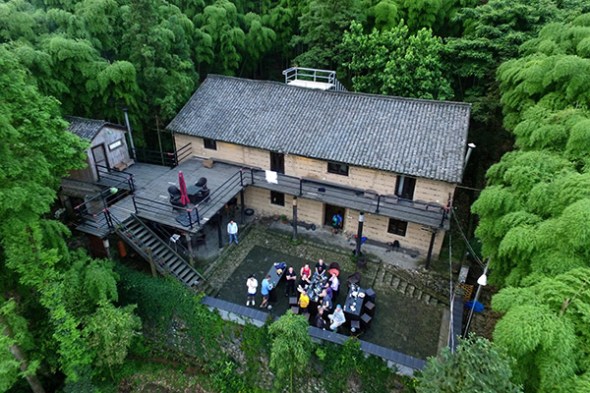
Guests at the Prodigy Outdoor Base, a hostel in Moganshan of Zhejiang province. (A Yuan/for China Daily)
"Can you come to my place this afternoon? This is really urgent," said Dong Tian, 42-year-old B&B keeper in Shanghai's suburban Xinchang town.
He made three phone calls to the service provider in just 10 minutes to confirm that he would come over to help deal with bugs in the house immediately.
The town, a prestigious location about a 10-minute drive from Shanghai Disney Resorts, has dozens of B&Bs that sprang up this year.
Like other B&B hubs in China, such as Moganshan in Zhejiang province, the "B&B rush" started with one successful property, which realized positive cashflow in four months.
The mushrooming of B&Bs continues unabated. Dong's seven-room property is one of the latest. It opened last winter and is yet to turn profitable.
Before he started the B&B, Dong worked in a bank as a corporate banking manager. He is good at numbers, and has a business mind. But he has never been trained in hospitality.
"If I had known that running a B&B was so complicated, I'd have thought twice (before taking the plunge). But you have to learn on the job, so to speak. At the drawing board stage when you calculate investment and returns on paper, you can't anticipate everything that would happen next," he said.
For B&B operators, running a property is a great challenge because consumers' needs change fast, and competition is getting fiercer as more players are entering the market.
In the past, B&B customers used to expect something that was "different" from standard services in hotels. They would tolerate problems such as bugs and leaking water pipes.
Not any more. They now expect something "beyond" standard services from B&B stays. They crave unique travel experience. There is no margin for error or disappointment, said Fan Yezheng, a researcher with the China Tourism Talent Research Institute.
"Food must be delicious and garden must be well-arranged to present a picture- and selfie-perfect background. Shampoo and body lotion must smell good. Tourists' expectations of B&Bs are changing," he said.
For operators, this means heavy investment in transforming the building into a customer-pleasing facility. This entails higher cost of maintenance, and requires constant learning to keep pace with consumers' preferences.
In China, B&B has been evolving from a mom-and-pop business to a professionally operated service.
It all started in the early 2000s. B&Bs first sprouted in rural areas where farmers would use their spare rooms to host urban tourists.
Guests would spend a weekend fishing in ponds, or picking fruits in orchards.
In the 2010s, B&Bs appeared in cities with tourists attractions, such as Xiamen in Fujian province, Dali and Lijiang in Yunnan province, and Hangzhou and Moganshan in Zhejiang province. Guests would stay for a weeklong holiday, exploring the scenic spots in the neighborhood and experiencing local cultural events.
Since 2015, private, exclusive and pricy B&Bs have been getting popular. Stays here could cost 5,000 yuan ($758) per room/night.
Guests are turning thrillseekers. Thrills come in the form of sipping champagne while in the bathtub, watching snow fall on the Great Wall from a bedroom window, lazing in a tent, or just staring at the cosmos in the evening as a gentle breeze blows through the nearby bamboo forest.
To ride the trend, some B&Bs are transforming from affordable accommodation to branded, luxury boutique hotel chains.
"For many, running a B&B is a way to make quick money, but in fact it's not (easy to make quick money in this business)," said Li Wei, a B&B interior designer and the host of a property in Hangzhou.
Average investment needed to convert a seven-room property into a B&B in first- and second-tier cities is about 2 million yuan. It would take roughly four to six years to break even, said Li.
"For B&B operators, the key to success amid fierce competition is to make the property a livable and attractive place," said Dai Bin of the China Tourism Academy in a forum.
"It requires detailed design, and each property needs its unique resource, be it an outstanding chef, an impressive interior design, or prestigious location with exclusive view. Homogeneous properties would only bore travelers and hurt the sector as a whole", he said.


















































